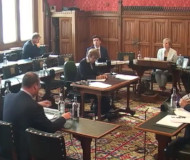5/3/2019
UK Parliament Hears From Pro-Motorist GroupAlliance of British Drivers challenges the wisdom of UK government Vision Zero initiatives that seek to lower speed limits and issue speeding tickets.

The UK Parliament is investigating why progress in reducing traffic fatalities has stalled over the past five years. The Transport Committee opened an inquiry in March, calling on interested parties and members of the public to submit evidence. The Alliance of British Drivers (ABD), an independent non-profit that represents the interests of motorists, used the opportunity to blame misguided strategies such as "Vision Zero."
"Current government road safety policies focus too heavily on technology-based enforcement," the group explained to the committee. "The resulting reduction in police traffic patrols has led to many dangerous behaviors not being addressed adequately."
The Vision Zero marketing effort has pushed for wholesale lowering of speed limits. The ABD argued that this obsession with speed enforcement fails to address the single most significant cause of collisions -- the failure to pay attention. In the UK, as in the US, failing to look properly was the cause of 39 percent of accidents, compared to just 5 percent caused by exceeding the posted speed limit.
Speed reduction solutions offered by Vision Zero, such as traffic calming and speed bumps, can even be counterproductive. According to an analysis of UK government statistics by TheNewspaper, traffic calming measures killed 23 people and sent 275 to the hospital between 2006 and 2015.
The ABD recommended that the UK Department for Transport return to a policy of setting speed limits that are appropriate to the conditions.
"Speed limits only benefit road safety if set at a level that the majority of drivers accept as reasonable," the group explained. "In practice this means setting them as close as possible to the 85th percentile speed, i.e. the speed that only 15 per cent of drivers would want to exceed anyway. Speed limits set this way lead to the smoothest traffic flow, low speed variance and the lowest accident risk. If set below this level, as is the case with many speed limits in the UK, speed variance increases, leading to more overtaking and driver frustration, with a consequent increase in accident risk."
The group also called for the elimination of the profit incentives that come from speed camera enforcement. The ABD prefers to see police officers enforcing traffic rules, as machines are not able to spot drunk drivers and other reckless behavior. Even better, the group wants a greater focus on driver education.
"The ABD has always strongly supported road user education over enforcement, while recognizing that there is a minority of people for whom the deterrent of enforcement is required," the group explained. "In this respect the ABD is at odds with the majority of the road safety establishment, which generally seems to dismiss driver training as ineffective."


